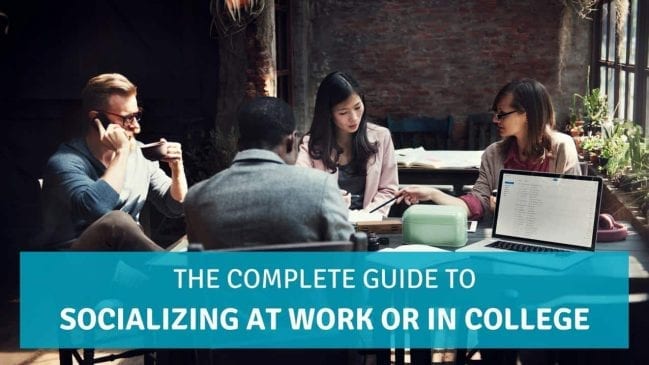Whether you’re a college student, a waitress, a retail worker, or someone who works in an office, you know that it’s important to socialize with the people you spend so much of your time with.
Not only can developing positive relationships with your classmates and co-workers make you happier to be at work, it can also help you to be more productive and successful overall.1
But the real question is: how do you do it?
Socializing at school and work is undeniably more complex than socializing in any other setting. For starters, you don’t always get to choose your co-workers or the people you’re going to take classes with. And on top of that, socializing can be tricky when you know you’re going to be stuck with these people for many years to come.
Some of the most common fears and concerns about college and workplace socializing include: introducing yourself at a new job, handling social rejection, and getting people to like you without seeming desperate for attention.
In this guide, you can find step-by-step instructions for dealing with each of these situations and more.
[Read my list here with the best jobs for people with social anxiety]
“How do I introduce myself as ‘the new person’ without being awkward?”
Whether you’re beginning a new semester or just got hired on at a new job, it’s important to make a good first impression. The focus of any school or workplace first impression is the way you introduce yourself.
First, make sure you’re prepared with a confident body language before you enter the room. Your body language is going to be sending signals to the people around you before you ever even open your mouth.
To express confidence through your appearance, keep in mind the following key components of a confident body language:
- Hold your head high and shoulders back as you walk– don’t slouch, cross your arms, or shove your hands in your pockets.
- Make eye contact with the people in your line of vision and smile when you meet their eyes.
- Don’t remain at the room’s perimeter; put yourself in a central location where you will be able to meet people.
Not only will you feel more confident as a result of altering your body language, but you will also have put yourself in a better position to begin making your introductions.
Next, it’s important to introduce yourself to a group of people rather than individuals when possible. For obvious reasons this makes less work for you since, depending on the size of the class or company, trying to meet everyone individually will be both time-consuming and exhausting (not to mention a little creepy).
Furthermore, as we’ll discuss later, introducing yourself to a group instead of the individuals within the group will make it easier for you to become a part of existing social circles.
When you approach a group of people to introduce yourself, make sure you approach with a smile. This is a signal that will let people know you’re friendly and will make them interested in hearing what you have to say and getting to know you.
As you begin your introduction, remember to keep it casual. Unless you’re speaking to authority figures or the situation obviously calls for it, there’s no need to be formal. In fact, a formal introduction will make you seem less approachable and will turn people off to having a conversation with you.
Now for the actual words. A good introduction is composed of these five things:
- A greeting
- Your name
- Your job/department/major/course of study
- An expression of enthusiasm
- (Optional) Location
So, as you’re smiling, holding a confident body language, and remaining casual, a workplace introduction will sound like this:
“Hey guys (greeting), I’m Joe Smith (name) and I just got brought on as the new IT person (job). I wanted to introduce myself and let you guys know I’m excited to work with you all! (expression of enthusiasm).”
If it’s relevant to your specific situation, it can be helpful to add something along the lines of, “My office is room 256, so feel free to stop by if you ever need anything! (location).” Letting people know where to find you in this way opens the door for future socialization.
If you’re introducing yourself at school, it will sound something like this:
“Hey! (greeting) I’m Sarah Jones (name) and I’m a sophomore Communications major (area of study). Math isn’t my strong suit, so I was hoping to meet a few people from our statistics class so we can exchange notes or form a study group. It’s nice to meet you! (expression of enthusiasm).”
If you’re having a hard time getting up the nerve to introduce yourself, keep in mind that it is expected for a new person to make efforts to meet the other students/employees. It’s not weird to introduce yourself, but it is weird not to introduce yourself.
At this point, no one has any reason not to be kind to you. So if you encounter someone unfriendly you can know for a fact that it has nothing to do with you, and you should simply avoid that person in the future.
If your concern is awkward silence, consider this: Meeting your new co-workers or classmates now is a great way to guarantee things won’t be awkward in the future. Once you’ve met everyone, you can walk through the hallway and say things like “Good morning Sharon! How was your weekend?” instead of awkwardly averting your eyes because you haven’t met Sharon yet.
Also, the sooner you introduce yourself, the sooner you can begin making friends. And the sooner you begin making friends, the less time you’ll have to spend in the awkward position of “new person.”
“How do I work my way into an existing social group?”
If you’re entering a new school or job, there’s a good chance that the people there have already formed their own social circles. But instead of viewing this as a cause for intimidation, view it instead as an easy way to make many friends at once.
First, it’s important to choose the right social circle.2 There are a few things to look for when choosing a group of people to befriend.
-
- Choose a group that is similar to you in some way. Whether it’s the type of humor they enjoy, the hobbies they participate in, or their fundamental beliefs, choosing a group of people with whom you share common interests is the best way to make meaningful friendships through school or work. This isn’t to say that there’s not a lot of benefit in befriending people who are different than you, but it’s important to avoid joining a social group that would require you to change certain aspects of yourself in order to fit in.2
- Look for a group composed of multiple casual friendships instead of a tightly-knit group of besties. The former will be much more welcoming to newcomers than a group of people who are very closely bonded.2
Once you’ve determined which group of people you’d like to spend more time with (and you don’t have to pick just one!), it’s helpful to introduce yourself to as much of the group as possible at the same time. When everyone in the group already knows who you are, you can focus on developing friendships with them instead of constantly having to introduce yourself to more people. Hanging out where that group tends to hang out is a good way to make sure you get an opportunity to meet many of them at once.
Because it can be difficult to invest the time to develop deep friendships with many people at the same time, the next step is to pick one or two people whom you particularly enjoy spending time with and invest more heavily in those friendships. Developing closer friendships with several people in the group will ensure that you get invited to group outings, giving you further opportunities to make multiple casual friendships within the group.
“What happens if I get rejected?”
No matter who you are or how good your socials skills may be, there is always a chance you will experience rejection.
In fact, the more you put yourself out there, the more likely it is that this will happen. But don’t let that deter you! It’s important to remember that rejection does not lessen your value or define who you are, and it’s better to look at it as a good thing because it prevented you from wasting your time investing in friendship(s) with that person or people.
Amy Morin, author of 13 Things Mentally Strong People Don’t Do, lists five of the best ways to deal with rejection.3
- Acknowledge your emotions. “[Mentally strong people] have confidence in their ability to deal with uncomfortable emotions head-on, which is essential to coping with their discomfort in a healthy manner,” she says.
- View rejection as evidence that you’re living your life to the fullest. If you’re experiencing rejection, it means you’re putting yourself out there. And while, yes, this does open you up to the possibility of rejection, it also gives you opportunities to experience good things that you would never otherwise have the chance to experience.
- Treat yourself with compassion. “[Mentally strong people] respond to negative self-talk with a kinder, more affirming message,” Morin says. This means that, instead of blaming yourself for the rejection (i.e. assuming you did something stupid), give yourself a break and understand that you’re just not going to click with everyone.
- Refuse to let rejection define you. Just because one person wasn’t interested in getting to know you better doesn’t mean that you aren’t worth getting to know. It can be easy to believe that one person’s opinion of you is everyone’s opinion of you, but you have to acknowledge that this is objectively untrue.
- Learn from the rejection. Morin recommends asking yourself, “What did I gain from this?” “Rather than simply tolerate the pain, [mentally strong people] turn it into an opportunity for self-growth. With each rejection, they grow stronger and become better,” she points out.
In addition, Dr. Elizabeth Hopper, psychologist, recommends re-directing your attention by focusing on something you care about. Not only will it distract you from dwelling on the rejection, thinking about the things that are important to you will also help remind you from where and what you should draw your sense of self-worth.4
Although rejection is always unpleasant, it shouldn’t prevent you from experiencing the positive socialization you deserve.
“How do I make people like me without seeming desperate?”
Another common fear that prevents many people from being social is the concern that people just aren’t going to like us. In addition, we fear that in trying to make people like us we’ll look like we’re trying too hard out of desperation for friendship.
However, when we look at what it takes to be a socially likable person we realize that it really isn’t difficult at all. In fact, the basis of being a likable person is quite simply being nice.
While there is such a thing as being too nice, few people have ever had a reason to dislike a genuinely nice person. Which brings us to the second characteristic of likability: being genuine.
To be genuine is to mean the things that you say, and to not say things you don’t mean. Inconsistency (i.e. when your words and actions don’t match up) is the biggest indicator of an ingenuine person.
Doing and saying what you think other people want you to do and say–because you want them to like you– is transparent and will serve the opposite purpose by making you less likable.
Instead, showing that you care about people by asking questions and being thoughtful, being yourself by saying things you mean and doing things you enjoy, and being confident without being arrogant will help you to bond with people and develop meaningful relationships at school and work.
A few more ways to be likable without seeming desperate for friends are:
- Don’t share everything about yourself at once. While it’s also important not to jump to the other end of the spectrum by becoming guarded, dumping your entire life story or personal details about yourself on the first person who shows an interest can be perceived as desperate.
- Play it cool. The word “cool,” when used in the context of socializing, can be pretty vague. But in this case, it simply means that you shouldn’t become visibly over-excited each time you get an invitation to a social event or someone expresses an interest in you. On the other hand, “playing it cool” also means that you shouldn’t get visibly upset if someone has to decline your invitation or you experience another form of rejection. Preventing your emotions from running this gamut of extremities (at least where other people can see them) and remaining relatively neutral in these types of situations will prevent you from appearing desperate.
- Be lighthearted. Don’t take everything–including yourself– too seriously. Be willing to laugh, joke, and be silly (at the appropriate time and place). Don’t refuse to participate in social events or conversations that are intended for fun because you’re afraid of looking stupid– this will make you appear uptight and like you’re too worried about what people will think, which again indicates that you may be trying too hard to be liked.
“How can I form a circle of friends quickly?”
The first, and easiest, way to make many friends quickly is by joining an existing group of friends at your school or workplace.
But another important skill to have that will assist you in making friends is rapport building.
To build rapport with someone means to express parts of your personality that the other person will like and find relatable. You determine what those things are by making observations about the other person.
Dr. Aldo Civico recommends the Matching and Mirroring Technique, which he describes as “the skill of assuming someone else’s style of behavior to create rapport.”5
The Match and Mirror Technique can be used in the following three categories of social behavior: body language, energy level, and tone of voice.6
In a nutshell, this means that you should observe the person’s body language (Are they touchy-feely? Do they use a lot of hand gestures when speaking? Do they prefer to stand close or far away when speaking to someone?), their energy level (Are they very excitable or more reserved?), and their tone of voice (Do they speak loudly or quietly? Do they emphasize words dramatically or do they use a more even inflection?).
Taking note of some of these details about the way a person communicates and incorporating them into your own communication with them will help them to feel like they can relate to you. However, it’s important not to copy their mannerisms so closely that they feel they’re being mocked; this can cause them to avoid spending time with you again in the future.
Another important factor in quickly making a circle of friends is to attend as many social events as you can. Not attending can prevent you from receiving future invitation as well as cause you to be forgotten about when it comes to socializing.
Initiating your own social events is another great way to make friends. Hosting social events and/or inviting people to social outings will make you a leader in the social circle and a central part of your friend group. It’s helpful to talk to one or two people before making a public announcement so that you can be sure at least a few people will be able to attend.
The ABC’s of Socializing
There are certain things that will always be necessary for successful socializing, regardless of the circumstances. I like to call these things the “ABC’s” of socializing:
A: Availability
B: Body Language
C: Conversation
Mastering each of these major social skills will help you to quickly develop positive working relationships that will benefit you in many ways.
A is for Availability
The first and most important aspect of socializing is making yourself available. If you’re constantly too busy to talk or spend time with other people, socializing is never going to happen.
“But the purpose of going to work is to work,” you might be thinking. And you’re right– but remember that developing positive relationships in your place of employment can actually help you to be more productive during the time you do spend working.2 Investing the time to socialize with other students or employees is also an investment in your academic or career success.
Like we talked about previously, there are times during your school or workday that naturally lend themselves to socialization. Your lunch hour, break, and commute are just a few of these opportunities.
But there are other ways to incorporate socializing as well. Two of the primary means through which human beings bond are 1) food and 2) celebration.
Many schools and places of employment already strive to bring in food whenever possible as well as to celebrate holidays, important dates, and various achievements of the company/institution.
But if your particular school or job does not, this could be a great way for you to introduce socialization opportunities that will make you a central player in your workplace’s social circle while promoting company-wide bonding.
Some ideas for classroom/office celebration include:
- Student/employee birthdays
- Anniversary of the school/company’s founding
- Significant anniversaries of employees’ hirings (i.e. Janice has been working here for 15 years now)
- Little known holidays (for example, May 9th is Lost Sock Memorial Day)
- Major holidays
Make sure to run your ideas by your authority personnel first, but as long as it won’t interrupt productivity, there’s no harm in finding fun things to celebrate to promote bonding and socialization in the workplace.
Asking people to take turns coming up with ideas for ways to celebrate and conducting a themed potluck meal or asking participants to contribute money for catering are ways to prevent the entirety of the financial and planning burdens from falling on your shoulders.
In addition to making yourself available for socialization by finding ways to celebrate throughout the workday, it’s also important to implement time management strategies (which can benefit you in many ways aside from freeing up time for socialization).
If you’re always having to work after hours, you won’t be able to carpool home or take the same bus or train as a coworker. If you regularly arrive to work late, you won’t have time to chat with your coworkers or fellow classmates before it’s time to get down to business.
The inability to manage your workload during scheduled working hours can cause you to skip your lunch break or eat at your desk, which will deprive you of crucial socialization opportunities.
A few time management strategies that will help prevent you from missing out on good socialization include:
- Purchasing a planner to prioritize tasks and list time limits during which tasks need to be completed
- Planning for one or two days of the week that you will stay late if necessary so that you can leave on time with your co-workers on the other days
- Phone or desktop timer apps that will help you know when it’s time to take a break, when it’s time to go home, or when it’s time to move on to a different task
- Phone or desktop apps that set reminders for certain tasks so that nothing sneaks up on you last minute
- Removing distractions that prevent you from working efficiently during your allotted “work time” (i.e. leave your cell phone in the car while at work or in class, block Facebook from your work computer, bring earplugs to block out noise distractions while working or studying, etc.)
Doing these things will help you make yourself available for socializing when opportunities arise.
B is for Body Language
Your body language is sending more signals to the people around you than you probably realize. If you’re worried that your co-workers find you unapproachable (as evidenced by the fact that people rarely talk to you or invite you to social events), it may be worthwhile to take a look at your body language.
- Do you smile at your co-workers/classmates when they pass by?
If not, this is a body language signal that is telling them you’re not open to interaction. - Do you share anecdotes, work/school-related stories, or other casual conversation topics with the people around you?
If not, they’re likely to find someone else to share their own anecdotes with. - How do you sit when at your desk?
A tense, hunched-over position will warn people away from trying to talk to you, while a more relaxed position sends the message “Come on in.” - Do you avoid eye contact with your co-workers or classmates?
If you do, you’re sending another signal that says “Don’t even bother.” - Do you make an effort to catch up with others when walking down the hallway or out of the building? If not, people probably assume you’d rather be alone.
- Have you turned down any past invitations?
If you’ve previously turned down even something as small as sitting with someone during your lunch break, there’s a good chance they decided not to ask you again. If you have to turn someone down, make sure that you invite them the next chance you get so that they know you’re still interested.
All of these and more can determine whether people find you approachable or not. Making minor changes to your body language, such as smiling more often, making eye contact with others, and sitting in a way that indicates you’re relaxed can go a long way towards attracting others to engage you in conversation.
And speaking of conversation…
C is for Conversation
Making conversation is a school/workplace social skill that is second in importance only to availability (because you can’t make conversation with people if you’re never available to spend time with them).
For many people, a conversation is the most intimidating aspect of socialization– but it doesn’t have to be. Learning how to determine people’s interests based on surface-level information and then asking questions that get them talking about those interests are the two major facets of making conversation.
First, look for a detail about that person. It could be something they’re wearing, a detail of their job, a bumper sticker on their car, or a picture hanging in their cubicle. Details such as these can inspire the questions you decide to ask.
You can also make a statement about your opinion on something in the room or an event taking place that day, and ask for the other person’s opinion on that same topic as well. Stating your own opinion first generally makes people more comfortable discussing their own thoughts.
Staying up-to-date on current events, popular culture, and school or workplace happenings are easy ways to always be prepared with a relevant conversation topic. But remember that most people are interested in talking about themselves, so making sure the person you’re speaking with can relate in some way to the conversation topic you choose is the best way to ensure they remain interested in the discussion.
The Fine Print
Although the ABC’s are necessary for effective socializing in any situation, socializing in the workplace requires a bit more as a result of the circumstances under which you are socializing and the greater amount of time you spend with your co-workers and classmates.
Thus I present “the fine print” of school and workplace socialization—the additional aspects of socializing in these environments that will guarantee your socialization success.
- Be Relatable. One of the best ways to bond with your peers is to show that you’re “like them” in some way by making yourself relatable. Commiseration is an easy way to do this; when someone shares a complaint, sympathize with them by sharing your own stories of similar situations or saying things like, “I hate when that happens!” or “I’m sorry, that’s the worst.” You can also be relatable by celebrating with people over their victories and expressing excitement about the things that excite them. Sharing things about your life—both the good and the bad—will help you seem down-to-earth and will make people more comfortable sharing their lives with you.
- Be Helpful. First, recognize that you should be cautious in your efforts to be helpful so as not to make the other person feel that you think them incapable of doing their job on their own. Some good ways to bond with others by being helpful include making observations about someone else’s wants and needs and meeting them without being asked. For example, if you know that Susan had to work late last night, bring her a coffee from Starbucks the next morning. Or if Eric’s staple supply is running low, grab him a box of staples from the supply room next time you pay a visit. If a co-worker’s workload is particularly heavy one day, offer to take some off their plate if you’re able. Being helpful in ways such as these will help you to bond with co-workers and classmates as you continue developing your relationships with them.
- Be Intentional. Take the initiative to make conversation and spend time with people at your school or place of employment. Invite people to spend their lunch break with you and invite others to social outings you have planned. A thriving school or work social life is not going to “just happen”- it requires intentionality on your part to create and maintain.
- Express Genuine Interest and Concern. Being genuinely interested in other people’s lives and having a true care and concern for them will make socializing less forced. When you are genuinely interested in people, questions and conversation will arise naturally. As a result, people will be more interested in spending time with you. One way to express genuine interest and concern is by paying attention to the details that other people are likely to overlook. Some examples include:
- “I noticed you missed the meeting yesterday. Everything okay?”
- “I could hear you coughing from my cubicle. Can I bring you some tea?”
- “I love your necklace with the three gemstones. Are those your kids’ birthstones?”
- “I saw your name was at the top of the list for highest midterm scores. Congratulations!”
These additional components will add the extra details to your socialization that you need to be successful when developing social relationships at work and school.
Socializing as Self-care
As the number of hours we spend in the office increases, the need for socializing in the workplace is increasing as well. Research has shown that the benefits of socializing at school and work can be significant. Finding ways to incorporate social time into your school/workday is easy if you know what to look for.
Our jobs and educations are important, but you can’t do a good job of working and learning if you aren’t doing a good job taking care of yourself. Self-care is more important now than ever before, and socializing is a critical component of any self-care regimen.
Also, check out our other guide on how to get better at socializing.
What changes are you going to make for the benefit of your social life at work or school? Tell us how it goes in the comments!






So much value in one post. Thank you.
Thanks, Rob! Glad you enjoyed it!